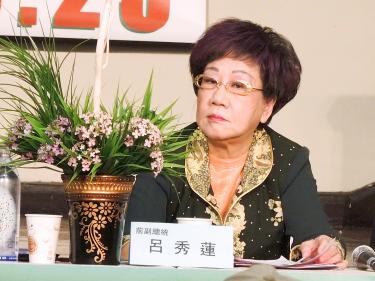Former vice president Annette Lu (呂秀蓮) yesterday questioned Taiwan’s retrocession, challenging the validity of the Cairo Declaration, and warned of Beijing’s “soft unification” strategy, while calling President Tsai Ing-wen’s (蔡英文) cross-strait policy evasive.
Taiwan’s retrocession is questionable, as the Cairo Declaration, on which claims to Taiwan by the Republic of China (ROC) and the People’s Republic of China (PRC) are based, is a “sheet of lies and a press release that was not signed by any country,” Lu said at a Retrocession Day forum she organized.
While the ROC and PRC claim that the Cairo Declaration is the legal foundation for Japan ceding Taiwan to China, it is not a legally binding international agreement, but rather a press release that was later rendered differently by the ROC, the US and the UK, Lu said.
The Qing Empire ceded Taiwan to Japan in 1895, and Japan did not officially renounce its rights to Taiwan until 1951, when it signed the Treaty of San Francisco, which was signed by 48 nations, but neither the ROC nor the PRC were signatories, she said.
The Chinese Nationalist Party (KMT) government took over Taiwan in 1945, but there was no international agreement at the time that could decide Taiwan’s sovereignty, she added.
The PRC also bases its claim over Taiwan on the notion that it should inherit the ROC’s territory, but while the PRC was established in 1949, the Treaty of San Francisco went into effect in 1952, meaning that Taiwan was not part of the ROC at the time and could not be “inherited,” Lu said.
The KMT and the Chinese Communist Party (CCP) have insisted on the validity of the Cairo Declaration, because there is nothing else they could use to claim that Taiwan belongs to China, she added.
The Cairo Declaration was a general statement by China, the US and the UK, and they did not completely agree on its contents, independence advocate Sim Kiantek (沈建德) said.
The section that said Taiwan, Penghu and Manchuria should be handed over to China was proposed by Chiang Kai-shek (蔣介石), but it was not supported by the US or the UK, Sim said.
Academia Sinica researcher Fort Liao (廖福特) said the Cairo Declaration is not an agreement, because it lacks as a signatory Japan, which controlled Taiwan at the time.
Japan did not renounce its rights to Taiwan until it signed the Treaty of San Francisco, suggesting that it held sovereignty over Taiwan until then, Liao said.
The reaffirmation of the Treaty of San Francisco in the Sino-Japanese Peace Treaty, signed in 1952 by the ROC and Japan, indirectly confirmed Japan’s claim over Taiwan in the period, thereby challenging the validity of the ROC’s control of Taiwan, Liao added.
Lu warned of China’s “soft unification” tactics and called on Tsai to initiate responses.
While Chinese President Xi Jinping (習近平) apparently rehashed Beijing’s existing Taiwan policy during the CCP’s 19th National Congress, there was something new and worrying about his speech, Lu said.
Xi elevated the status of the so-called “Taiwan issue,” sanctifying it among the 14 principal policies he announced at the congress, she said.
“That suggests Xi plans to resolve the ‘Taiwan issue’ by the end of his term. Although there is no ‘unification timetable,’ it is implicitly suggested,” Lu said.
“I am worried that people will lower their guard just because Xi did not mention a plan to achieve unification through military means. His ‘soft unification’ strategy is actually the most aggressive,” she added.
In response to Xi’s introduction of “soft unification” tactics — including extending national treatments to Taiwanese to integrate them with China — Lu called on Tsai to interact with Beijing in a more concrete way, instead of reiterating empty policy.
Ridiculing the president’s cross-strait policy as a reworked version of former president Chen Shui-bian’s (陳水扁) “four noes and one without” pledge, Lu said that Tsai’s “four noes” lack content.
Tsai has reiterated that she will not change her goodwill toward China or her promises, and that she will not return to a confrontational approach nor succumb to Beijing’s pressure.
“What is goodwill and what are the promises?” Lu said, criticizing what she called the evasiveness of Tsai’s cross-strait policy.
Taiwan faces a different type of confrontation, and Tsai should skillfully react to Xi’s “soft ball,” Lu said.
Tsai is expected to elaborate on her cross-strait policy at a forum marking the 30th anniversary of cross-strait exchanges today.
Source: Taipei Times - 2017/1026









